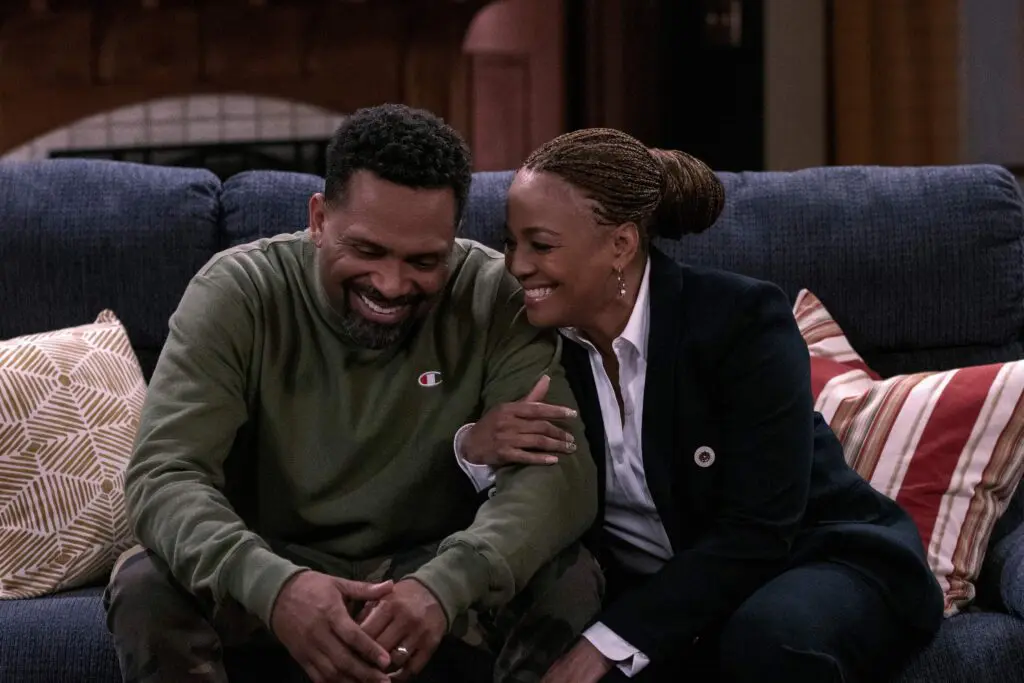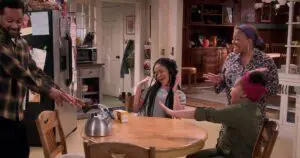Summary
While most people might think of ABC’s Emmy award-winning comedy when they hear the phrase “modern family,” the funny thing is that The Upshaws actually embodies the idea and the aesthetic of a modern family more accurately due to its shameless authenticity.
This review of The Upshaws season 1 contains no spoilers – the sit-com series will be available to stream on Netflix on May 12, 2021.
Since it first began developing original content, Netflix has only seen success with long-form dramas and feature films. There’s also an argument that its docuseries have garnered just as much critical and commercial acclaim over the years; however, its sitcoms have always suffered. From that obvious attempt at a That ‘70s Show reunion, The Ranch, to the more recent Tyler Perry-inspired Dad Stop Embarrassing Me, the streamer’s short-form content has consistently fallen flat.
While there will inevitably be an argument that Fuller House succeeded, it was also a revival of one of the most popular shows from the ‘90s. Unfortunately, in my opinion, Netflix hasn’t succeeded with anything original… until now.
The Upshaws, Netflix’s newest multi-camera sitcom, is not only its best sitcom yet, but it’s also its funniest. Created by Regina Y. Hicks and Wanda Sykes, the series revolves around a working-class black family in the Midwest as it navigates the ups and downs of life. Despite its admittedly basic premise, what sets this show apart from most other family sitcoms — and especially other black family sitcoms — is that its characters look, talk, and feel real.
Now, that’s not to say that characters in other sitcoms aren’t realistic. In fact, shows like The Fresh Prince of Bel-Air, Family Matters, and even black-ish all contain great characters, however, none of them feel real. And while all of the aforementioned shows also tackle timeless themes in a hearty and humorous way, rather than hold a mirror up to the audience, Netflix’s The Upshaws unflinchingly shatters the glass to show that its subjects are the same as us.
In the series, Mike Epps plays the family’s patriarch, Benny Upshaw. And while he checks the same boxes as most other TV dads, he also checks some extra ones. What makes Benny (and this entire series) stand out so much is that, despite being married with kids, he also has a kid from another woman. Back when he and his wife Regina, played by the always lovely and iconic Kim Fields, took a small break from their marriage, Benny got led astray and ended up getting another woman pregnant. But the drama doesn’t end there either. After Regina and he eventually reconciled, he got her pregnant too.
By the time we meet the characters in the show’s pilot, years have passed since these (literal) bumps in the road. Regina and Benny are still together and have even had another kid; however, the fact still remains that he has another child he has to take care of and an unavoidable anchor in the form of his “baby mama”. Rather than turning his back on the kid, Benny insists on stepping up to make sure he feels just as special as the rest of the members of his clan.
The result is the best kind of remix of the classic family sitcom. That’s only one of the things that I thought made this show so great.
Additionally, Regina’s realization that she has to stop living in the past, and her subsequent side quests to both cope with Benny’s mistakes and better herself makes for another compelling arc. She even brings in this workplace comedy aspect to the series, as we follow both her constant attempts to get recognition for her hard work from an underqualified boss and her eventual pursuit of a career change. While that pursuit only adds to the fire and her and Benny’s marriage, as heartbreaking as it is to watch them argue, one of the most admirable things the show does is keep the conflict going even after the credits roll. Because most fights in real-life conflicts are rarely resolved in less than half an hour.
In addition to chronicling Benny and Regina’s misadventures, the series also follows Regina’s sister Lucretia, played by Sykes. Perfectly portraying that one annoying aunt everybody has, Sykes nearly steals most of her scenes on the show. However, as clever and critical as she is, it’s the show’s exploration of her own vulnerabilities that makes her such a brilliant character. For example, one of Lucretia’s most definitive traits is a leg injury for which she carries a cane throughout the series. Another is her complicated love life.
Not only is no one perfect on this show, but the imperfections are visible. Because of that, the representation feels tangible.
Even through supporting characters, like Benny’s kids, the show never wastes an opportunity to tackle an important subject or issue. Without spoiling anything, everything from social media to bullying to sexuality is fair game. Though you might not expect it, The Upshaws season 1 has got just as much wisdom to dispense as it has jokes to tell.
Now even though it may have something in it for anybody, it isn’t for everybody. Because the show isn’t on cable, it’s plain to see that the writers and ad-lib artists Sykes and Epps take full advantage, but only in the best and funniest ways possible. By that, I mean that the language can be crude, so that’s a warning for those who might want to watch it with their families. While I personally didn’t have a problem with that, I understand that some will. So even though it features a family, it’s not family-friendly.
If I’m being honest, my only real complaint about the series (so far) would be the pilot. It’s heavy. If you don’t know what to expect, it’s easy to get either lost, overwhelmed, or be reluctant to continue. Now, I don’t mean that it tackles any dark or depressing subject matter; but while the first episode offers a strong sense of what to expect from the series, it leans a little too far into the absurd in order to make an impression. On the other hand, if you’re able to push through, the comedy, the character development, and the continuity in episodes two and onward are far more successful with much less effort.




